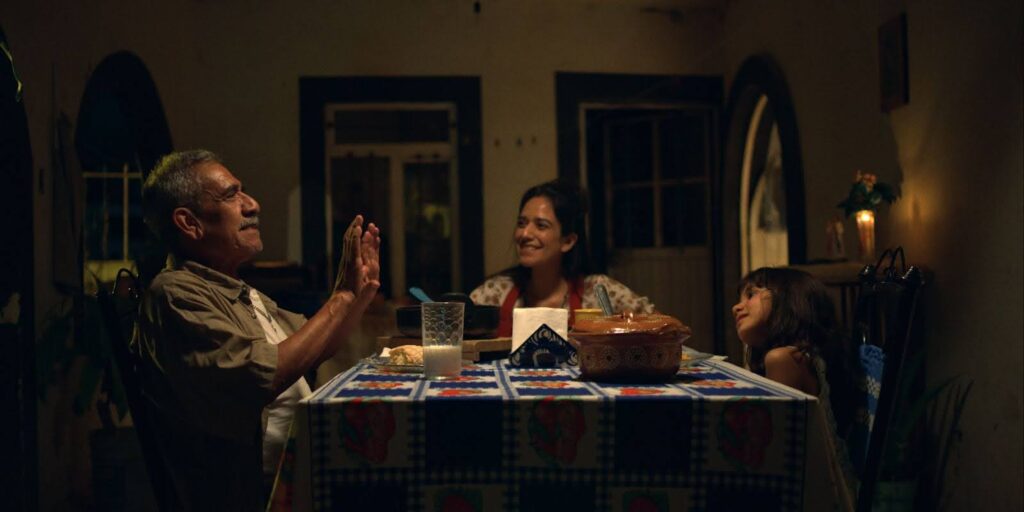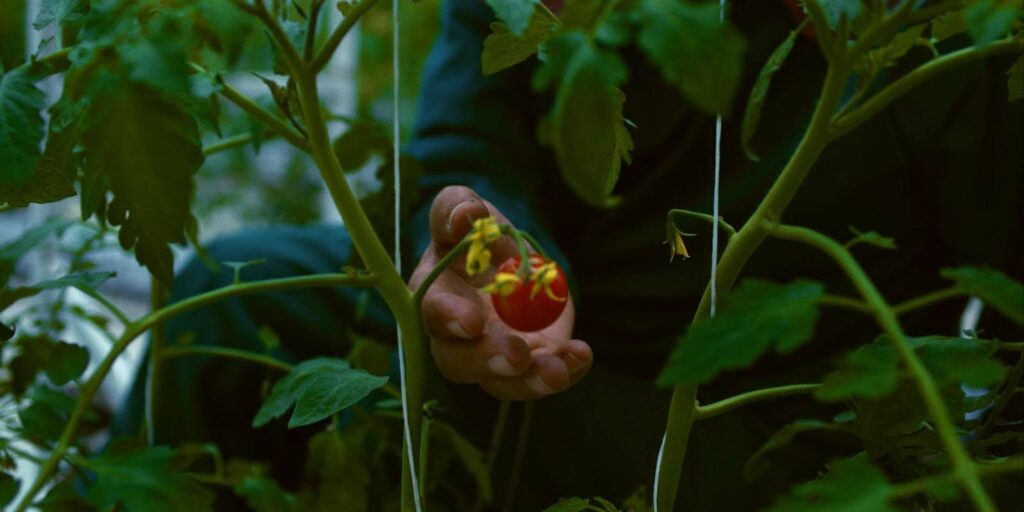Director: Cristobal Abugaber
Writers: Cristobal Abugaber
Stars: Eligio Meléndez, María Meléndez, María Fernanda Ayala
Synopsis: An aging farmer refuses to leave his long standing way of life behind at the risk of losing what truly matters to him.
One of my most vivid childhood memories involves a car ride with my mom. She’s driving me to my weekly trombone lesson, a short trip that takes us past my old elementary school, just five minutes down the road from our house. Its sight leads me to tell her that I think I might like to become a teacher when I grow up; “I’ll teach English and coach the basketball team,” I say. She nearly slams on the brakes before asking why in the world I’d ever want to do that in the future, given how much I’ve always talked about wanting to go into sports broadcasting. (We see how that turned out, don’t we?) I think my main reasons for this fleeting dream were rather trite: Multiple breaks during the school year, summers off, and a built-in connection with fellow teachers and students, the likes of which I’d seen forming around me while attending school for the better part of my young life. That’s the key, though: At the time that I expressed this desire, school – and playing for my school basketball team, by extension – was all I knew, and at a glance, it seemed like an easy future. Plus, my mom was a teacher, which explains her alarm at the future career her child pondered for approximately three minutes before leaving it behind with the exhaust fumes that spurted out of our 2003 Chrysler Town & Country.
Had I elected to pursue that fleeting path, one that I now understand to be relatively thankless and exhausting, I’m sure I would have found a semblance of happiness, but would I have been fulfilled? Of course, that’s an impossible question to answer, but I feel reasonably fulfilled as I continue to walk along the path I chose to take. I like that this idea is precisely what drives Cristobal Abugaber’s deeply moving short The Perfect Tomato, the internal conflict between two roads, the questions one asks oneself as one walks further down it, and what happens when external factors play a part in what direction you take next.
Nacho (Eligio Meléndez), an aging and dedicated farmer who has spent decades working in fields and gardens alike, has lived a simple life that some might even go so far as to call “safe.” He hasn’t stopped working since he was a young man so as not to break from routine, and so that his work never remains in doubt, something he has long required in order to provide for his family. Abugaber’s opening scene sees Nacho and his granddaughter Maria (María Fernanda Ayala) working together in a greenhouse, the former describing growing patterns to the curious latter, who enjoys accompanying him perhaps just to stay occupied, though she’s a wise kid, one who seems aware of and drawn to his passion. As they travel home, sitting in a truck bed being driven by one of the farm’s many workers, we learn that her father is not in the picture, a presence that Nacho somewhat fills yet Maria still longs for; “Do you think he’ll ever try one of our tomatoes?” she asks, with Nacho telling her, “The United States is very big,” a way to let her down easy.

Not long after they’ve returned home and sat down for dinner, Nacho’s daughter Elena (María Meléndez) informs him that she has an opportunity in front of her: the opening of a pottery store in the city. Nacho expresses disbelief at the notion that his daughter would be commuting from the countryside to the city each day, though she soon informs him that they would have to move. “It’s a once-in-a-lifetime opportunity, Dad,” she tells him only after cinematography James Sweeney has cut away from a slow-zooming wide shot that captures the trio in a moment of change, a visual representation of Nacho’s walls closing in as his daughter’s horizons extend. It’s a moment of loss for him and a massive personal win for her, leading to a crossroads that is familiar in context yet singular within this family dynamic. Nacho believes that “the land has given [them] everything,” and that the money he could earn if promoted to working at the ranch’s urban distribution center would add nothing to their life. “More money? What else do you need?”
It’s an obvious conflict— “You’re giving up on your dream!”/“No, Dad. I’m giving up on yours—yet, it’s unique how Abugaber depicts it from Nacho’s perspective. Typically, we’d instinctively root on the child (grown or otherwise) whose ambitions are set to lead them to their promised land while booing the parent doing what they can to hold them back. Yet it’s difficult not to sympathize with a man who, in this situation, would be leaving behind everything he knows in order to fulfill someone else’s desires, even if that someone else is his own flesh and blood. Abugaber constructs this tension with great care, understanding the concerns of both parties and while the film’s resolution might feel clear to anyone who has ever seen a family-focused movie before, The Perfect Tomato’s conclusion ultimately resonates as one about the sacrifices we make for those we love, not what we lose when we concede to them. It’s clear that Abugaber understands that making choices for the betterment of our loved ones’ lives isn’t much of a loss at all but merely a different kind of gain. Even if it means that we must say goodbye to one form of comfort, as long as we are able to lean on those closest to us, we can discover it anew elsewhere.

So, no, I never became a teacher. I also didn’t become a world-famous trombone player or a basketball coach that the staff at other schools feared when I walked into a gym. (I never had that presence anyway.) But life shifted for me in ways that I wouldn’t have dreamt of all those years ago while driving to Vince Ercolamento’s music school, and I’m endlessly grateful for every sacrifice I made, and for those that the people in my life have made for me, too. I intend on repaying them, and I intend on yielding in many more worthwhile ways when I have a family of my own. You can find comfort again; family, though, is a once-in-a-lifetime gift.
Grade: B





